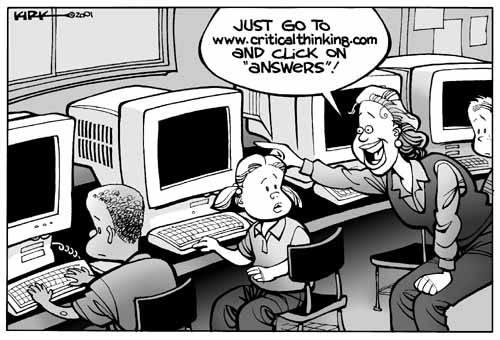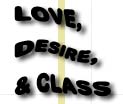|
II. Essay
Questions (Choose 3; one answered orally with your group in class.
25% + 25% +20%)
A. Subjectivity
1. How does a baby develop its sexuality and
desire according to Freud? And how does Lacan modify Freud's view?
2. Contemporary
critical theories no longer view human subjects as autonomous and unified
as liberal humanism does. Pick up one theory to analyze its views of human
subject and then relate it to one literary or cultural example.
B. Language
and Society
3.
A child's entry into society, for Lacan, entry into "the Symbolic
Order." Please use either Roland Barthes' semiotics or Michel Foucault
to explain why and how we enter society and get controlled by it through
languages.
4. How does
Marx analyze capitalism, its commodification and its relations of production?
Use either a cultural or literary text(s) to illustrate your points.
5. How does
the idea of "control by consent" apply to both Althusser's theory
of ideology and Gramscian hegemony? Give one example to show how this
works.
C. Literature,
Consumer Culture and Ways of Reception
6.
How does Freud and Marx
explain fetishism respectively? Give two examples (one each) to illustrate
their points.
7. So far you
have been exposed to different ways of reading, reception or consumption.
Choose a text (literary or cultural) and give two readings (or ways of
consuming) it.
8. In class
we 'touched on' several examples of Taiwan's cultural phenomena (e.g.
clothing fashion, collection of Hello Kitty, positions of foreign laborers,
Taiwanese' faddism, Taiwanese interest in others' cultures). Pick up one
and provide two examples (texts) to analyze and comment on.
D. Love
Stories and New Criticism
9.
This semester we have read the following literary and filmic texts which
are to do with love (love between a couple). Choose one to do a new critical
reading, compare it with another one, and then make sense of your comparison
by contextualizing them (putting them in their own context or the context
of your reading them).
16th century -- Shakespeare's love sonnets,
19th century -- "Snowed Up" by Richard Jeffries, Poe's stories,
E. Barret Browning and Robert Browing love Poems;
modern -- "Eveline" by James Joyce; The Great Gatsby;
"The Love Song of J. Alfred Prufrock";
1950's - 60's -- "Faces of Madness"; "Morning";
瓊瑤﹔
contemporary -- 〈城市飛行〉《我的野蠻女友》﹔Mulholland Dr.
* Possible topics:
1. gender: idealization of one's lovers (women), gender difference,
stereotype, inequality;
2. views of love shown through
-- treatment of endings; love and death;
-- views of self -- love as fusion, love against self-preservation,
love as self-projection, a way to fill up the lack;
-- marriage (as economic exchange, as continuation of one's fantasies),
-- language and emplotment (e.g. of Romantic love, of poetry, of opera)
-- etc. etc.
 or think harder!
or think harder!
|




![]()